Album Review: Station to Station by David Bowie
Review by Jennifer Childers
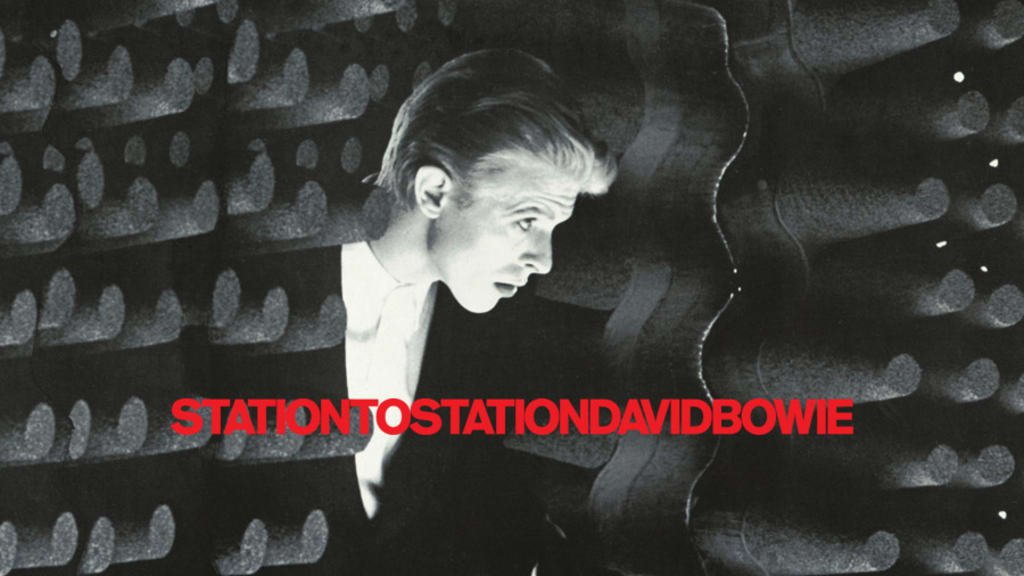
I mentioned in a review I did of Pink Moon by Nick Drake that every musician seems to have an album where they are presented at their most vulnerable--where we see a genuine look at the pains they are going through. Most Bowie fans would pinpoint his 1977 album Low as this album for him. Personally, I would beg to differ. Low is definitely a great album with stellar experimentation and isolation is a huge feeling one gets throughout the record.
However, apart from "Always Crashing in the Same Car"--the non-instrumental songs, for the most part, don't touch on his then state of mind as heavily. Rather it is more reflected in the ambient tracks. Which is fine. But, if we're looking for a more lyrical example of the "Tortured Artist Album" as I have come to call it--I think his 1976 album, Station to Station would be a better pick.
It all started in 1975 when Bowie was cast by director Nicolas Roeg to star as a humanoid alien in The Man Who Fell to Earth. Roeg wanted to cast Bowie after watching Alan Yentob's BBC documentary about Bowie, Cracked Actor. In it, Bowie's true offstage personality is shown in detail. He is tired, stressed, paranoid--not at all the confident rock god he had presented himself as. Roeg loved this more vulnerable side to Bowie and decided to exploit the crap out of it for his upcoming film, which would be Bowie's first appearance in a feature film.
Knowing how creative minds work, Roeg warned Bowie that the character may stay with him long after filming. So with permission from Roeg, Bowie created the "look" of the main character himself--The red and blonde hair, elegantly swiped back, pale as a sheet, with semi-formal attire. This was the beginning of Bowie's new persona, The Thin White Duke.
Filming commenced on The Man Who Feel to Earth, where Bowie plays Thomas Jerome Newton--an alien in a human disguise who goes to Earth to get water for his home planet which is experiencing a drought. He becomes stranded on Earth, and the humans around him use his alien identity for their own gain. The film has since become a cult classic, and Bowie's performance in the film has been praised over the years. But, the thing is: According to Bowie--he wasn't actually acting during any of it:
"I just threw my real self into that movie as I was at that time...I was going a lot on instinct, and my instinct was pretty dissipated. I just learned the lines for that day and did them the way I was feeling. It wasn't that far off. I actually was feeling as alienated as that character was. It was a pretty natural performance...a good exhibition of somebody literally falling apart in front of you. I was totally insecure with about 10 grams [of cocaine] a day in me. I was stoned out of my mind from beginning to end."
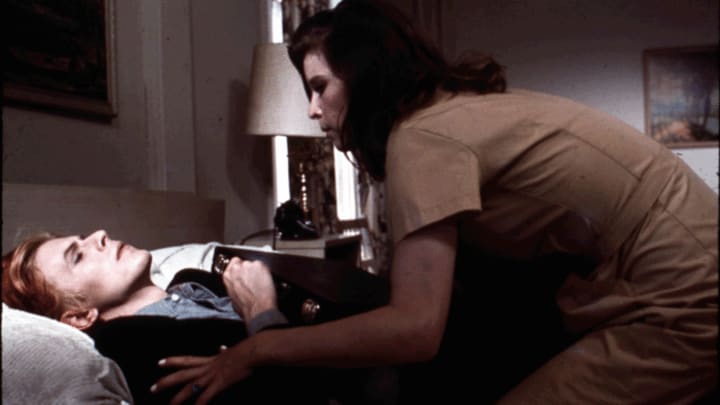
After filming, and release, Bowie lost himself in his newfound persona. He lived on a meager diet of cocaine and milk. His weight dropped to below ninety pounds, his skin was so translucent that one could almost see right through it; he looked like an emaciated angel who would crumble to dust if even breathed on. All the money he made from the movie and from record sales went towards fueling his addiction.
In late 1975, recording of the album commenced. But Bowie was so bugged out of his mind on drugs, that he claimed many years later that he had absolutely no recollection of ever recording Station to Station. He later claimed that he only knew the recording of the album happened in L.A because "I've read [that] it was."
Despite Bowie allegedly having no memory of the album, it overall received positive reviews, even though it was different from his other records. This was a whole new Bowie--The Thin White Duke didn't have the flamboyance and colorful, confident, cool aura of Ziggy Stardust, Aladdin Sane, or Halloween Jack. There was something intense, dark and slightly sinister about The Thin White Duke. Bowie described him as a mad white supremacist aristocrat who sings with emotional intensity, but is truly a hollow and unfeeling individual--or "ice masquerading as fire."
A few years earlier, Bowie had said his personas he created were characters that he played as an actor. However, with The Thin White Duke, Bowie definitely lost himself totally in this persona. This was the downward spiral that would later manifest itself more atmospherically in Low.
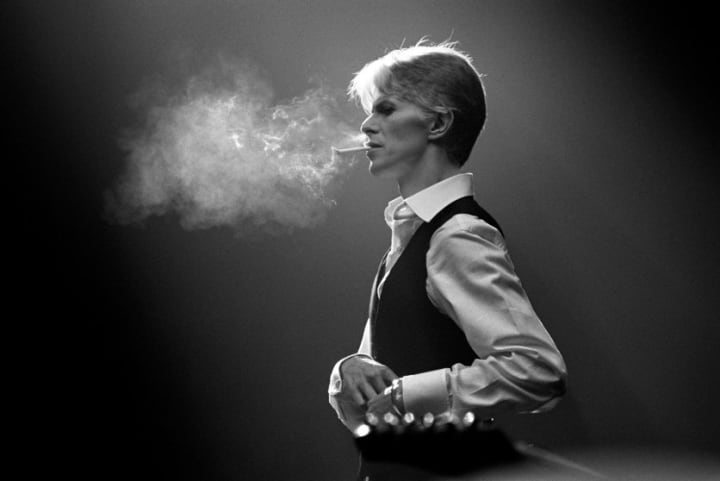
Inspired by the likes of German electronic groups like Kraftwerk and Neu!, the album opens with the title track which gave Bowie fans a preview of the more electronic sound of the upcoming Berlin trilogy. (That is, Low, Heroes, and Lodger--all recorded with Brian Eno in Berlin over the next few years.) "Station to Station" is long and plodding, but as stated previously, it's sung with an intensity that is almost frightening. If I needed to pick a favorite Bowie track of all time, this would be it. It introduces The Thin White Duke, his fascist viewpoints, his false emotional intensity, and "his" (Bowie's) drug problem.
While rock stars at the time usually tried to find euphemisms for their drug of choice to slip past the censors, Bowie, taking a page from the Lou Reed and Eric Clapton Books of Songwriting, boldly confesses in the song that cocaine is his drug of choice. ("It's not the side effects of the cocaine/I'm thinking that it must be love") The song combines a weird fusion of the "plastic soul-funk" that we saw in his previous album, Young Americans; along with his new German rock inspired sound. Sounds like a bizarre blend, and it kind of is. But it really works!
The second track is one of two singles to come out of this album: "Golden Years"--a blend of soul-funk and classic doo-wop. This makes more sense when you realize that Bowie actually wrote and recorded the track in mind for Elvis Presley to cover. Presley turned it down. But one can definitely hear how Elvis was an inspiration for the song. Though Bowie was beginning to tread more towards German rock influences, his early influences in American rock n' roll shine through on this track. This ended up becoming one of the more mainstream songs on the album due to its poppy, catchy sound.
The next track is "Word on A Wing" which is a heartfelt song. Though we're supposed to view everything on this album through the eyes of the emotionally cold Thin White Duke, this song is one of the few glimpses we get of Bowie's most true and vulnerable nature during this period. The song was written by Bowie while on the set of The Man Who Fell to Earth as a cry for help to a higher power. Though, claiming to not be religious, Bowie admitted in a 1980 interview: "It was the first time I'd really seriously thought about Christ and God in any depth, and 'Word on a Wing' was a protection. It did come as a complete revolt against elements that I found in the film. The passion in the song was genuine...something I needed to produce from within myself to safeguard myself against some of the situations I felt were happening on the film set."
Whether or not you are religious, it is still a sweet, sincere track, and Bowie really sells it with such ingenuity and fervor that you kind of can't help but feel moved by it.
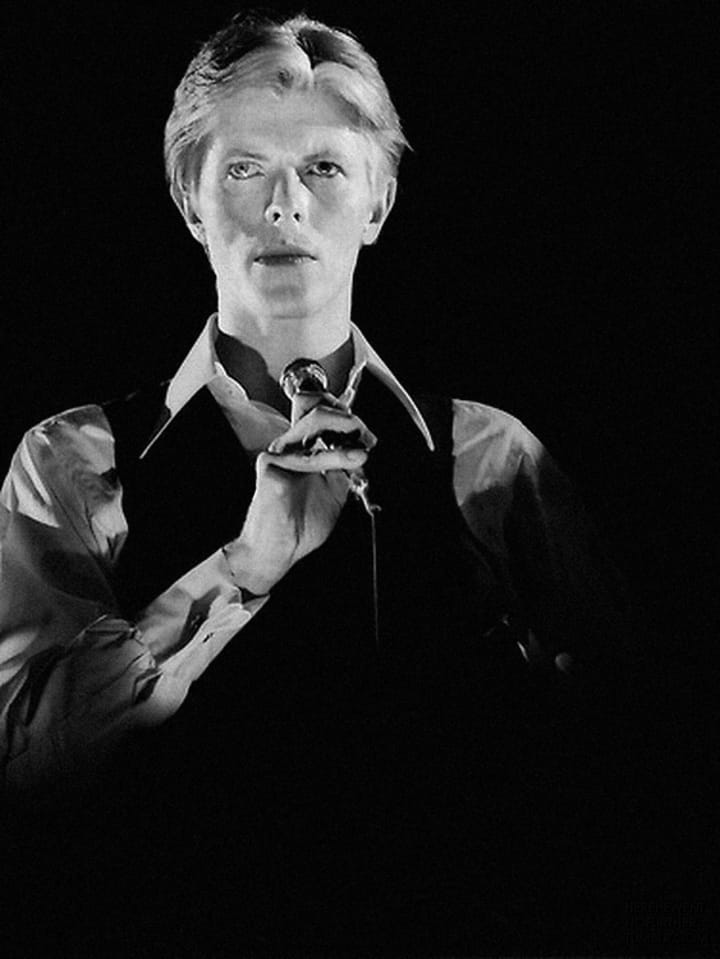
"TVC 15" is the next track, which gives us a complete 180 in mood from the album's previous track. The song was inspired by a drug-fueled episode Bowie's friend and fellow musician, Iggy Pop, had in which he thought Bowie's television was swallowing his girlfriend. Bowie creates an odd proto-cyberpunk narrative in which the narrator's girlfriend crawls into the television and gets lost, so he ventures in after her. The jaunty nature of the music, and the surreal elements in the lyrics give you a kind of humorous mental image of an old Twilight Zone episode having a manic episode. This song became a single in the UK, and honestly, it's kind of an awesome song. It's a good emotional break from some of the heavier themes in the album--even if it is still technically about the dangers of drug consumption.
Venturing into disco territory, the next track is "Stay", which is another personal favorite. There isn't a whole lot to be found about the song's lyrical background. It sounds like it's your run-of-the-mill love song--Or at least The Thin White Duke's version of a love song--dripping with emotional intensity, but deep down there's a sinister void. By far the best part of the song though, is Bowie's voice, and the wailing guitar by Carlos Alomar. They go together like chocolate and peanut butter--Perfect.
And then we have the final track on the album, "Wild is the Wind" which is a cover of Nina Simone's cover of a Johnny Mathis song. It's a great way to end the album, because I think it showcases Bowie's vocal talents better than any other track on the album. I have always said that I think Bowie has an underrated voice. What do I mean by that? Over the years he's become better known for his gender-bending and mind-blowing visuals. But what about his voice? Is it actually good? Yes. His voice is beautiful, always has been. And I think this track really accentuates the unique nuances in his singing that really make his voice one of a kind.
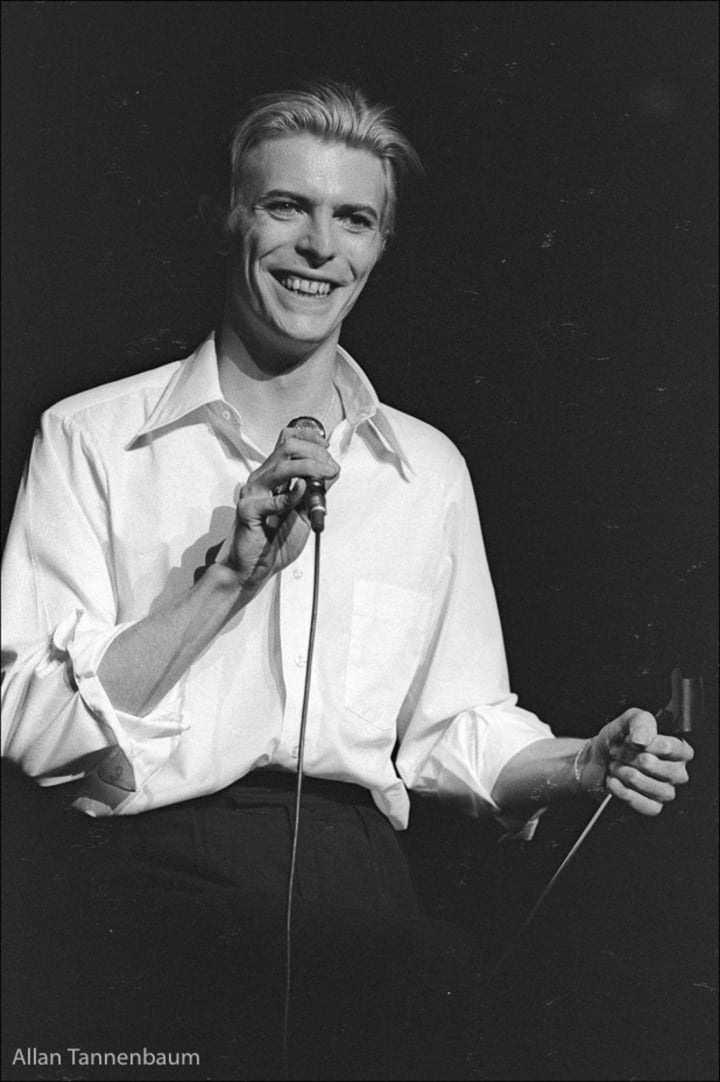
Station to Station is just a great album. There isn't too much else I can say to sum up all of my opinions on it. It's just great. And if you, like me, are a fan of "The Tortured Artist" album that nearly every musician has at least one of, Station to Station is definitely one to add to your list!
About the Creator
Jennifer Childers
I just write thoughts on anime, games, music, movies, or other things that are on my mind. Occasionally a poem or short story might come up.






Comments
Jennifer Childers is not accepting comments at the moment
Want to show your support? Send them a one-off tip.